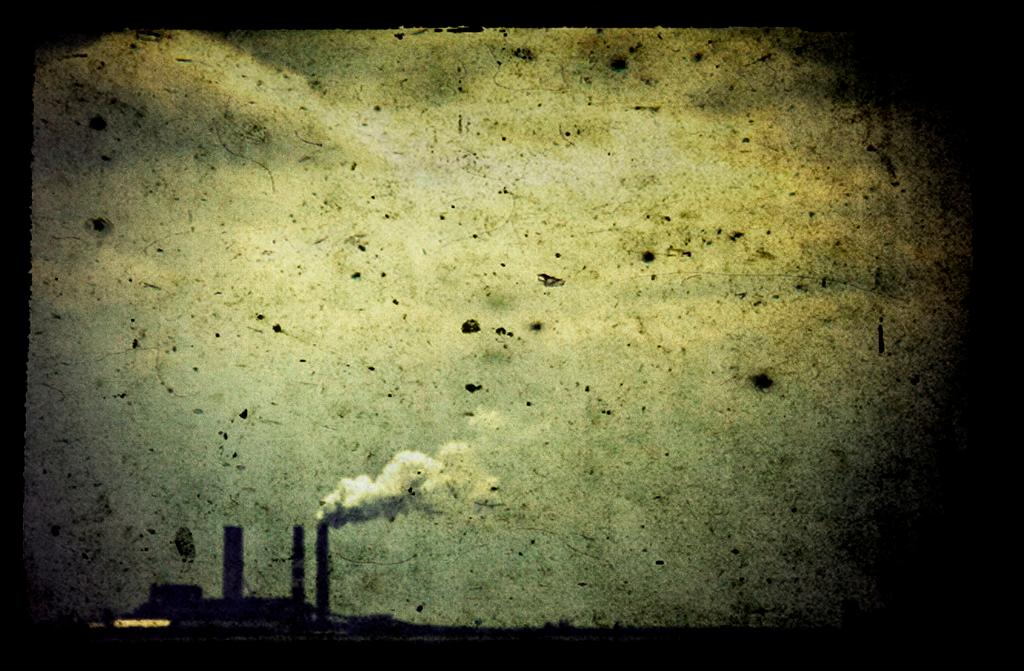The Monster by Alex Nye

The Monster by Alex Nye
From the window of Mia’s room she could see the petrochemical plant glowing in the dark. It breathed fire into the sky; a monster of tubular steel with elephantine towers and a heart of boiling oil. It burned forever and it never stopped. It ate up the oxygen they breathed, and released poison. It took away their air. Occasionally the sirens would go off, and people would lock their windows, but no one really minded. No one really cared.
It was like a dragon’s lair and it breathed dragon’s fire, morning, noon and night.
Most people tried to forget it was there, but Mia never forgot.
It gives us diseases, she thought, and bears us ill-will. It has many eyes.
At night, and in the early hours of a new dawn in winter, those eyes would peer at her, fiery-red in the Falkirk gloom.
In her head she referred to it as the Monster.
The Monster was always out there, but she wasn’t looking at him now.
Grangefield, Mia thought, was ugly and grid-like, set out by town planners like a board game; snakes and ladders. Life was like that, hit and miss. If you hit a square with a ladder on it you climbed upwards, where good stuff awaited; if you hit one with a snake, you were spat out in some backwater where you did not want to be. At the moment Mia felt as if her life was all about snakes and landing on the wrong squares.
Who would live in a town that looked like a board game, unless you were forced to?
There were cherry blossom trees planted along the streets, and they added a splash of colour in the spring; but it didn’t last long before the easterly winds ripped the flowers off; then they would lie like muddied pink tissue paper on the pavement, turning grey underfoot.
There was one thing Mia did like about Grangefield though, and that was the sports stadium. It had its own athletics track. She would go there often to train, but you needed a crowd to really spur you on.
In her more hopeful moments Mia dreamed of running in the Olympics one day.
Her phone buzzed beside her, and its screen lit up briefly in the shadows. The sight of it made her heart sink. They could reach her even here, in the privacy of her room. Nowhere was safe from them.
She thought of Mrs Mackenzie’s words. We live in a much fairer society today!
Do we? Mia thought.
She tried to ignore her phone but it purred once more.
She lay on her bed, listening to Angie and Clifford climbing the stairs, their tread heavy. She heard them switch on the TV in their own room next door.
The walls were paper-thin and voices came through… a journalist reporting on the state of things ‘elsewhere’.
“An international disaster on a scale never before seen since the Second World War…”
Angie clicked buttons and changed channels, and a different voice leaked through the walls now, that of a slightly peevish-sounding woman being interviewed on the street outside her home.
“I don’t care what they say. There aren’t enough jobs to go round, and that’s a fact. We haven’t got room for no more foreigners – not till we can look after our own.”
“Switch that off Angie,” Clifford grunted.
Silence. Then they opted for something a little more bland. A fly-on-the-wall documentary about home improvements, with the volume turned down.
Mia rolled onto her side, and stared at the blue striped wallpaper which to her looked like the bars of a prison cell.
She didn’t hate Angie and Clifford, but they were so flat and dull. Angie talked about her new extension all the time, and what a difference it would make, while Clifford did the maths, working out how many more young people they might be able to foster.
Mia had a trick to help her drift off to sleep, and it gave her comfort.
She imagined herself as a bird of prey floating on high above the island of Coll. She would examine the island from this aerial view. If she turned her head sideways she could see her own wing-tips, and the coastline far below, waves crashing against the rocks, so far away you couldn’t even hear them murmur, only see their soft white underbellies unfurling. She felt powerful like this, listening to her own hawk-cry. She flew over Coll where her family used to go on holiday when she was little. She saw the white curve of the bay, the sand made up of the fine ground down powder of billions of seashells, the marram grass blowing in the breeze, camp fires on the edge where one or two families set up their tents, and she could see the little white cottage that – as far as she knew – still belonged to her. There it was, waiting, just like always, reminding her of a time long ago when she still had a family. Before her dreams turned to ash.
Before she ended up here.
In Grangefield, within sight of the Monster.
THE MONSTER © Alex Nye 2020
Relatert innhold
"The Monster" uses a number of powerful images. Use these images as a starting point for an analysis of metaphors and similes.